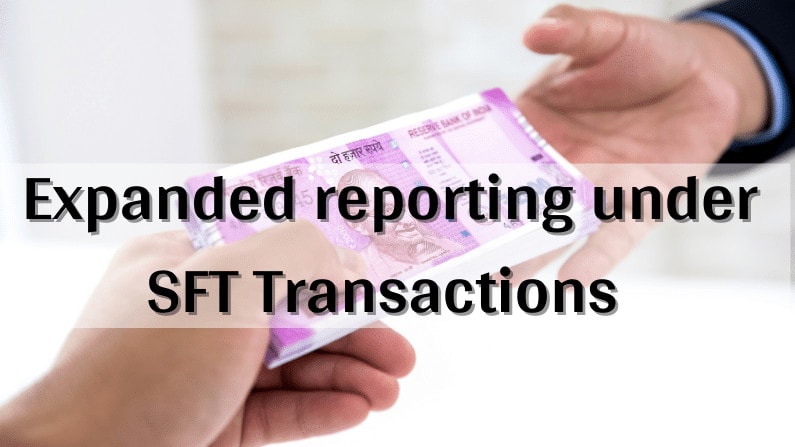Eradicating black money has always been one of the key planks of every Government. The main reason for the generation of Black Money amidst a large group of people in the country is to escape from the plight of paying large amounts of income taxes. The Government of India came forward to curb the scope of black money by taking numerous initiatives in this regard. One such spacious activity taken by the government is to report the SFT transactions (specified financial transaction).
Now the very first question arises is how this reporting helps the government in curbing black money and reduction in concealment of taxable Incomes?
Income tax liability is a self assessed liability by the assessee and the assessee tries to understate his taxable income by not reporting various transactions and end up paying less taxes.
Therefore, the department has shifted the onus of reporting to the counterparty of transactions. Now, the department lists down specified persons who are required to report specified transactions to the department periodically. Since, the department is already available with major information, an assessee can’t escape his income tax liability on such income.
Here comes into mind what actually specified financial transactions are to be reported and who is responsible to report such types of transactions..??
1. Specified Financial Transactions: SFT Transactions
Section 285BA of Income Tax Act, created responsibility to report Specified financial transactions popularly known as SFT. As per Section 285BA of Income Tax Act, Any of the following transactions can be prescribed as Specified financial transactions:
- transaction of purchase/ sale/ exchange of goods or property or right or interest in a property; or
- rendering any service; or
- transaction under a works contract; or
- transaction by way of an investment made or an expenditure incurred; or
- taking or accepting any loan or deposit
Under any of the above categories, the department may prescribe different values for different transactions to be reported by different persons.
Provisions of reporting of SFT have been prevailing since a long time. As per changing scenarios and requirements, various transactions have been added to this list over the period of time to prevent taxpayers from understating their taxable Income.
2. Changes proposed in SFT Transactions (13.08.2020)
Government has launched a new platform for “Transparent Taxation-Honoring the Honest” under income tax act and there under various changes are made toward implementation of faceless Assessment and electronic Appeal procedures to increase transparency in the income tax system.
Further, with an objective to improvise handholding on the transactions, the Government has also proposed to widen the scope of Reporting of SFT. Same has been done by adding various new specified transactions and also required various new persons to report SFT to ensure better compliance and Transparency.
Please note that no formal notification or press release has been issued to notify changes in scope of SFT. However, the same has been given through pamphlets issued on different government twitter pages.
As part of proposed expansion of reportable transaction under SFTs, following transactions would be under scanner:
- Payment of property tax above Rs.20,000 per annum
- Health insurance premium above Rs.20,000
- Payment to hotels above Rs. 20,000
- Life insurance premium above Rs.50,000
- Electricity consumption over Rs.1 lakh per annum
- Payment of educational fee/donations above Rs.1 lakh per annum.
- Purchase of jewellery, white goods, painting, marble etc. above Rs.1 lakh
- Deposit/credits in the current account above Rs.50 lakh
- Deposit/credits in the non-current account such as savings accounts above Rs.25 lakh
- Domestic business class air travel/ foreign travel
- Share transactions/de-mat accounts/Bank lockers
Further, following additional persons are also proposed to compulsorily file their return in form Annual Information Report (AIR):
- A person having bank transactions above Rs.30 lakhs
- All professionals and business having turnover above Rs 50 lakhs
- Payment of rent above Rs.40000.
Apart from these proposed changes, there are various transactions which are already required to be reported under SFT.
3. Nature and value of transaction required to be reported by specified persons
Section 285BA authorizes the Central Board of Direct Taxes (CBDT) to prescribe different values with respect to specified financial transactions in respect of different specified persons having regard to the nature of such transactions.
Accordingly, list of specified transactions required to be reported by specified persons is provided in Rule 114E is given below:
- Cash payment made for purchase of bank drafts or pay orders or banker’s cheque where aggregate payment made during a year is INR 10 Lacs or more.
- Cash payments for purchase of prepaid instruments issued by RBI where aggregate payment made during a year is INR 10 Lacs or more.
- Cash deposits or withdrawals in one or more current accounts of a person aggregating INR 50 Lacs or more during a Financial Year.
- Cash deposits in one or more accounts, other than a current account and time deposit,(e.g. Savings accounts) of a person of INR 10 Lacs or more during a Financial year.
- One or more time deposits (other than renewed time deposit of another time deposit) of a person aggregating INR 10 lacs or more during a Financial year.
- Credit card payments made by any person either in cash or by any other mode in a FY where aggregating of payment is INR 1 lakh or more in cash or INR 10 lakh or more by any other mode.
- Receipt from any person for acquiring bonds or debentures issued by the company or institution (other than renewal) aggregating of INR 10 Lacs or more in a Financial year.
- Receipt from any person for acquiring shares (including share application money) issued by the company where Aggregating payment is Rs 10 lakh or more in a FY
- Payment made for Buyback of shares from any person (other than the shares bought in the open market) for aggregating INR 10 lacs or more in a Financial year.
- Receipt from any person for acquiring units of one or more schemes of a Mutual Fund (other than transfer from one scheme to another) aggregating INR 10 Lacs or more in a Financial year.
- Receipt from any person for sale of foreign currency including any credit of such currency to foreign exchange card or expense in such currency through a debit or credit card or through issue of travellers cheque or draft or any other instrument where aggregate amount received or incurred during the FY is INR 10 Lacs or more.
- Purchase or sale of immovable property by any person where Transaction value or valuation of stamp duty, as determined under Section 50C, is Rs 30 lakhs or more.
- Cash receipt by any person for sale of goods or services of any nature (other than those specified at Sl. Nos. 1 to 10) exceeding INR 2 Lacs.
- Cash deposits during the period 09th November, 2016 to 30th December, 2016 aggregating to Rs 12,50,000 or more in one or more current account of a person or Rs 2,50,000 or more in one or more accounts.
Different persons are specified for reporting above mentioned transactions such as Financial Institutions, Banks, Post Offices etc.
4. Due date of filing of SFT Transactions
SFT shall be furnished in Form 61A on or before 31st May immediately following the financial year in which transaction is registered or recorded.
Such specified persons were required to submit ‘Annual Information Return (AIR)’ introduced in 2003 with respect to specified financial transactions under Section 285BA.
5. Changes made in 26AS with effect from 01.07.2020
With an objective of ensuring better compliances, various changes are made in Form 26AS over the period of time. Major changes are also made recently with effect From 01 July 2020 wherein various new transactions and information has been added in Form 26AS itself. Government has launched a revised form 26AS which included high value transactions from SFTs from this assessment year, which would be now directly visible to the taxpayer at time of filing of Income Tax return.
Details of changes made in Form 26AS can be accessed.
6. Consequences of Not filing information regarding SFT under section 285BA
- Where a person failed to furnish a statement under section 285BA on or before 31st May immediately following the financial year then the concerned income tax authority can issue a notice requiring him to furnish a statement within a period of 30 days from date of service of notice.
- If a furnished statement is defective, then the concerned income tax authority can require him to rectify such defect within a period of 30 days or extended period.
- If such return is not rectified within time permitted by concerned Income tax authority then it shall be presumed that such person has furnished inaccurate information in the statement.
7. Failure to furnish SFT Transactions
- If a person fails to furnish SFT report under section 285BA by the due date then penalty shall be levied of Rs.500 per day till such failure continues.
- Further, if a notice is served on a person requiring him to furnish SFT Transactionsstatement and such person fails to file the same within time allowed in notice then penalty of INR 1000 per day will be levied from the day immediately following the day mentioned in notice.
For Example: An assessee fails to file a statement of financial transactions till 31st May 2020. Notice is received from Income Tax Authority u/s 285BA to file till 31st July 2020 for which the notice is served on 1st July 2020. Now there are two possibilities:
a. Return filed on 31st July 2020: Ankur will have to pay penalty of Rs.30500 (61days*Rs500 per day i.e. from 1st June to 31st July)
b. Return filed on 31st August 2020: Penalty will be Rs.30500 plus additional 31000 (31 days* Rs.1000 per day i.e. from 1st August to 31st August).
8. Inaccurate information in SFT Transactions
As per section 271FAA, if a person who is required to furnish specified financial report, provides incorrect information in the statement due to any of the following reasons:
- inaccuracy is due to a failure to comply with the prescribed due diligence requirement or is deliberate on the part of that person; or
- the person knows of the inaccuracy at the time of furnishing the report, but he fails to inform the concerned income-tax authority about such default; or
- where the person found inaccuracy after furnishing the statement and fails to inform and furnish the correct information within 10 days of filing.
Then the concerned income tax authority may impose a penalty on such a person of INR 50,000.






